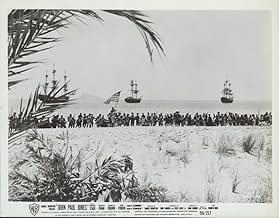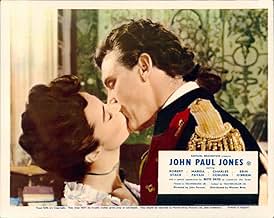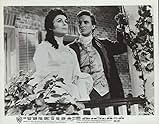CALIFICACIÓN DE IMDb
6.3/10
1.5 k
TU CALIFICACIÓN
La carrera del héroe naval de la Guerra Revolucionaria desde su juventud en Escocia hasta su servicio a Catalina la Grande de Rusia.La carrera del héroe naval de la Guerra Revolucionaria desde su juventud en Escocia hasta su servicio a Catalina la Grande de Rusia.La carrera del héroe naval de la Guerra Revolucionaria desde su juventud en Escocia hasta su servicio a Catalina la Grande de Rusia.
- Dirección
- Guionistas
- Elenco
Jean-Pierre Aumont
- King Louis XVI
- (as Jean Pierre Aumont)
Susana Canales
- Marie Antoinette
- (as Susan Canales)
Georges Rivière
- Russian Chamberlain
- (as Jorge Riviere)
Robert Cunningham
- Lt. Wallingford
- (as Bob Cunningham)
Opiniones destacadas
I was delighted to see this film as I am a voracious consumer of anything about the American Revolution. Aside from any possible historical flaws mentioned by others I found some of the directing touches quite interesting. Most novel was the way George Washington was portrayed when Jones went to visit him at Valley Forge. He was filmed only from the back as would be seen by some observer (e.g. news reporter ) in the room. The effect was quite powerful. It saved us worrying about things like if the actor playing Washington looked enough like him etc. and simply gave us a ghostly impression of the Washington we read about in the history books - namely, a giant of a man both physically and morally and probably the greatest man in history. It occurred to me that Director John Farrow was portraying not the man but rather alluding to the LEGEND on screen. If that was the aim he certainly succeeded.
The 'living presence' of the legend was enhanced by the fact that the image spoke in that arcane English of the time.
The net result was that a huge cinematic impression was provided of a very great man. Nice directing twist innovation !
The 'living presence' of the legend was enhanced by the fact that the image spoke in that arcane English of the time.
The net result was that a huge cinematic impression was provided of a very great man. Nice directing twist innovation !
Not entirely accurate but at times rousing nautical adventure purporting to tell the story of the early American naval hero.
Stack is okay in the lead but some of his early career zest would have benefited the character. What we get instead is a rigid and mostly humorless stick figure in the lead. Some reverence for Jones is that man's due but a bit more animation in Stack's performance would have made him more accessible.
What helps deflect from his wooden performance is an incredibly colorful and sumptuous production with several maritime battles thrown in for good measure that's a treat to the eyes. Aside from that there are some very well cast performers in key roles. MacDonald Carey makes a fine Patrick Henry and Bette Davis, dolled up in a sky high wig, ermine and pearls, has a lot of fun in her tiny cameo as Catherine the Great. The real standout though is Charles Coburn as Benjamin Franklin. So right is he for the role, not just in appearance but getting the balance of the pattern of Franklin's personality right, a mix of seriousness and the twinkle in his eye and sense of fun that old Ben was renown for that it makes you regret that he never had a chance to more fully portray Franklin in a biography.
As a true document of John Paul Jones life it may miss the mark but it's still a decent entertainment.
Stack is okay in the lead but some of his early career zest would have benefited the character. What we get instead is a rigid and mostly humorless stick figure in the lead. Some reverence for Jones is that man's due but a bit more animation in Stack's performance would have made him more accessible.
What helps deflect from his wooden performance is an incredibly colorful and sumptuous production with several maritime battles thrown in for good measure that's a treat to the eyes. Aside from that there are some very well cast performers in key roles. MacDonald Carey makes a fine Patrick Henry and Bette Davis, dolled up in a sky high wig, ermine and pearls, has a lot of fun in her tiny cameo as Catherine the Great. The real standout though is Charles Coburn as Benjamin Franklin. So right is he for the role, not just in appearance but getting the balance of the pattern of Franklin's personality right, a mix of seriousness and the twinkle in his eye and sense of fun that old Ben was renown for that it makes you regret that he never had a chance to more fully portray Franklin in a biography.
As a true document of John Paul Jones life it may miss the mark but it's still a decent entertainment.
Just a question; where was JPJ filmed? (I'm looking for ALL locations)and does the movie archive keep a list of unnamed and uncredited extras who appeared (in the backdrop) of the film? My folks have had a replica of the Declaration of Independence in our living room that they say was a souvenir given to people (i.e. my uncle) who were hired by the producers as extras. He said that he was a signer of the document. He and my aunt also kept a copy in their house. It's been awhile since I've seen the movie, but I will look more closely next time to see if I recognize him. My uncle wasn't an actor, but a military man (retired, I think, by that time). He had to have been in the right place at the right time to be chosen as an extra. I'd love to have more info. Jeff
I enjoyed the movie despite its historical inaccuracies, and okay action but that is what I expect and enjoy in old Hollywood movies especially when they were made in color. This movie caught my eye when I saw that it was a Robert Stack movie. Always an imposing figure. And then the added benefit of seeing the lovely Marisa Paven in color! She was Italian, so I must say, Che Bella Donna! Molto bene per me a guadarla a lei. (That is if my Italian is any good?!?). So, while my wife found it boring and quickly gave up on it, I found its slow pace with vivid color a welcome.
Although the writing credits on this film mention a story by one of the writers called "Nor'wester", it seems the roots of this film go further back. A brilliant, unscrupulous hack named Augustus Buell wrote a series of so-called biographies at the turn-on-the-century of various American heroes. His biography of Andrew Jackson is like his biography of John Paul Jones - he "embellished" it. In the biography of Jackson Buell (unfortunately) invented the charming quote that Jackson's two greatest regrets were never hanging John C. Calhoun for treason, and never killing Henry Clay in a duel. Unfortunately Buell's lies have been quoted by better historians for decades. Marquis James' Pulitzer Prize Winning biography of Jackson used Buell a-plenty. His work on the life of Jones was so damaging to scholars that the great historian Samuel Eliot Morison wrote an in-depth appendix of the lies Buell wrote. An example: Buell said there was a love triangle in Virginia between Patrick Henry, John Paul Jones, and the woman they both loved (whom Henry married). This never happened. It is in the film JOHN PAUL JONES.
Not everything is in the film. Buell had a fictitious quote from Napoleon I that he would have used Jones (who lived his last years in Paris)to head his navy against Nelson at Trafalgar. Napoleon never said that - and probably did not even know who Jones was. A lot of Buell was removed - but a lot remains in it.
The film also suffers from the star. Robert Stack was an admirable Elliot Ness on television, and had a goofy streak he revealed in AIRPLANE, CADDYSHACK II, 1941, and other late films. But he could seem stiff and overblown - and he does so in this film. He does seem properly heroic, but he rarely shows the darker side of Jones' character. He was a disciplinarian, and harsh tempered. He probably was responsible for killing two crewmen, one who tried to strike the flag of the Bon Homme Richard during the battle with the Serapis, and one just before the war, when Jones was Captain John Paul of the British merchant marine. In the earlier instance Jones knocked down a mutinous (or seemingly mutinous) seaman, and the other crewmen were ready to bring charges against him with the British authorities. This led to Jones fleeing to the 13 colonies, and changing his name.
Another thing cleaned up (or at least changed) is the career of Jones as a Russian Rear Admiral under Empress Catherine the Great (Bette Davis). The film suggests that the Empress hired Jones, in part, due to his attractive appearance (after all, the Empress had all those affairs). Actually she hired him needing able sea commanders to fight the Turks in the Black Sea. And the experiment did not work because of jealousy by Russian commanders (possibly assisted by Catherine's chief minister Potemkin - whom the famous battleship in the Eisenstein movie is named after). Also, Jones left under a scandal - he may have picked up an underage girl, and was arrested (but released when he agreed to leave Russia). It was then that he moved to Paris (where he died in 1792). Oh, Benjamin Franklin died in 1790 in Philadelphia - he had stopped being Minister to France in 1784 (when he was replaced by Thomas Jefferson). He could not be present when Jones is dying in 1792 in Paris (as he is in the film). Well - it is a movie.
Some of the history is correct. Jones was (with John Barry and Joshua Barney) the only American Revolutionary naval heroes to win battles against the British. Jones (with Franklin's help) did remarkable work with three ships: the Richard (named for Franklin's "Poor Richard"), the Alliance, and the Ranger. He did sizeable damage to British commerce, and (best of all) actually raided the British Isles (his old home area in Scotland). The battle scenes dealing with the climactic duel between the "Richard" and the "Serapis" is well done. It even reminds us to the bizaare behavior of Captain Landais, a French madmen who was in command of the "Richard"'s companion ship, who actually fired on the "Richard" during the battle.
Also, on a minor note - in one moment of the film Stack is angry about the delays from Congress in giving him a ship, confronting the head of the Naval Committee. This is Mr. Hewes of North Carolina. It oddly enough fits in as a sequel to a minor figure in the musical 1776: Mr. Joseph Hewes of North Carolina is the leader of that state's congressional body, who frequently waits for the mentally stronger Edmund Rutledge of South Carolina to vote first. He also criticizes the Declaration of Independence for failing to include anything about "deep sea fishing rights" See, even there Mr. Hewes was concentrating on sea matters.
So the film does have some moments worth watching. But it is too stiff and too long.
If you want to know more about Jones, read the biography of Jones by Morison, or the more recent biography that has been published. At least you will get the full and true story.
Not everything is in the film. Buell had a fictitious quote from Napoleon I that he would have used Jones (who lived his last years in Paris)to head his navy against Nelson at Trafalgar. Napoleon never said that - and probably did not even know who Jones was. A lot of Buell was removed - but a lot remains in it.
The film also suffers from the star. Robert Stack was an admirable Elliot Ness on television, and had a goofy streak he revealed in AIRPLANE, CADDYSHACK II, 1941, and other late films. But he could seem stiff and overblown - and he does so in this film. He does seem properly heroic, but he rarely shows the darker side of Jones' character. He was a disciplinarian, and harsh tempered. He probably was responsible for killing two crewmen, one who tried to strike the flag of the Bon Homme Richard during the battle with the Serapis, and one just before the war, when Jones was Captain John Paul of the British merchant marine. In the earlier instance Jones knocked down a mutinous (or seemingly mutinous) seaman, and the other crewmen were ready to bring charges against him with the British authorities. This led to Jones fleeing to the 13 colonies, and changing his name.
Another thing cleaned up (or at least changed) is the career of Jones as a Russian Rear Admiral under Empress Catherine the Great (Bette Davis). The film suggests that the Empress hired Jones, in part, due to his attractive appearance (after all, the Empress had all those affairs). Actually she hired him needing able sea commanders to fight the Turks in the Black Sea. And the experiment did not work because of jealousy by Russian commanders (possibly assisted by Catherine's chief minister Potemkin - whom the famous battleship in the Eisenstein movie is named after). Also, Jones left under a scandal - he may have picked up an underage girl, and was arrested (but released when he agreed to leave Russia). It was then that he moved to Paris (where he died in 1792). Oh, Benjamin Franklin died in 1790 in Philadelphia - he had stopped being Minister to France in 1784 (when he was replaced by Thomas Jefferson). He could not be present when Jones is dying in 1792 in Paris (as he is in the film). Well - it is a movie.
Some of the history is correct. Jones was (with John Barry and Joshua Barney) the only American Revolutionary naval heroes to win battles against the British. Jones (with Franklin's help) did remarkable work with three ships: the Richard (named for Franklin's "Poor Richard"), the Alliance, and the Ranger. He did sizeable damage to British commerce, and (best of all) actually raided the British Isles (his old home area in Scotland). The battle scenes dealing with the climactic duel between the "Richard" and the "Serapis" is well done. It even reminds us to the bizaare behavior of Captain Landais, a French madmen who was in command of the "Richard"'s companion ship, who actually fired on the "Richard" during the battle.
Also, on a minor note - in one moment of the film Stack is angry about the delays from Congress in giving him a ship, confronting the head of the Naval Committee. This is Mr. Hewes of North Carolina. It oddly enough fits in as a sequel to a minor figure in the musical 1776: Mr. Joseph Hewes of North Carolina is the leader of that state's congressional body, who frequently waits for the mentally stronger Edmund Rutledge of South Carolina to vote first. He also criticizes the Declaration of Independence for failing to include anything about "deep sea fishing rights" See, even there Mr. Hewes was concentrating on sea matters.
So the film does have some moments worth watching. But it is too stiff and too long.
If you want to know more about Jones, read the biography of Jones by Morison, or the more recent biography that has been published. At least you will get the full and true story.
¿Sabías que…?
- TriviaThe real John Paul Jones' actual name was John Paul. He added the name "Jones" to avoid prosecution when he was accused of killing a seaman over a dispute of wages.
- ErroresThe song played on the bagpipes early in the file, "Scotland the Brave", was not written until the beginning of the Twentieth Century. Scotland The Brave was published in the 19th century.
- Citas
Captain Richard Pearson: Captain, are you surrendering? Do you ask for quarter?
John Paul Jones: No sir! I have no yet begun to fight!
- ConexionesFeatured in Finding Your Roots with Henry Louis Gates, Jr.: Hollywood Royalty (2019)
- Bandas sonorasYankee Doodle Dandy
(uncredited)
Traditional Anglo-American song
Selecciones populares
Inicia sesión para calificar y agrega a la lista de videos para obtener recomendaciones personalizadas
- How long is John Paul Jones?Con tecnología de Alexa
Detalles
Taquilla
- Presupuesto
- USD 4,000,000 (estimado)
- Tiempo de ejecución
- 2h 6min(126 min)
- Mezcla de sonido
- Relación de aspecto
- 2.35 : 1
Contribuir a esta página
Sugiere una edición o agrega el contenido que falta

























